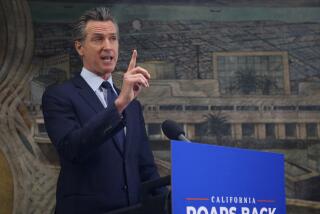Editorial: Of course California should share its wealth with residents who need it

The COVID-19 pandemic wreaked havoc on the finances of millions of Californians, leaving many of them teetering on the edge of solvency even as the economy rebounds. But the state’s fortunes have never been brighter.
Gov. Gavin Newsom said Monday that the state government is expecting a whopping $100 billion more in revenues this year than it planned for — $75.7 billion in extra tax revenue and $26 billion in federal coronavirus relief funding. It’s quite a reversal in fortune from a year ago, when state officials projected that the pandemic would leave the state in a $54 billion hole this year.
Though nearly two-thirds of the bonus cash will be diverted by state law to schools, rainy-day savings and pension debt, the governor and Legislature have about $38 billion left in discretionary spending — and a equal number of ways to spend it.
On Monday Newsom laid out his proposal for a portion of the surplus: $12 billion to fund another round of $600 stimulus checks to two-thirds of Californians, but expanded to include tax filers with up to $75,000 in adjusted gross income last year, with a $500 bonus if they have dependents. He also called for doubling the fund to help renters pay off all their back rent, to $5.2 billion, and providing up to $2 billion to help state residents pay utility and water bills.
This is just an opening salvo before the governor begins the annual budget negotiations with the Legislature. The Legislature is likely to have its own ideas about how to spend the windfall.
The cynics would have you believe that the governor’s relief proposal is an attempt to buy some voter appreciation ahead of the recall election later this year. Maybe so, but at this point, Newsom can’t utter a single word without someone impugning it as a ploy to avoid being recalled.
More important, Californians have already made it clear that they want to share the wealth when the state takes in more revenue than it needs. In 1979, during the height of the state’s tax revolt, voters passed Proposition 4, which set a formula for annual spending limits and required that any extra revenue above that be returned to taxpayers. (Voters amended it in 1990 to split the surplus with schools.)
California hit that cap this year, for only the second time in 42 years. This means that the state will be rebating money one way or the other. But wealthy Californians don’t need a rebate as much as those at the other end of the economic ladder who have been disproportionately impacted by pandemic-related business closures, and it’s appropriate that any rebates go to them first.
Newsom is expected to roll out more proposals in his California Comeback Plan later this week before heading into the annual budget talks. We hope that there’s more than short-term measures among them. People like to get checks in the mail, and a few hundred bucks and help with back rent might help people avoid eviction today. But the state has costly long-term problems that cry out for attention too, such as a crippling housing shortage and climate change, and it shouldn’t ignore them when it has the means to do invest in solutions.
More to Read
A cure for the common opinion
Get thought-provoking perspectives with our weekly newsletter.
You may occasionally receive promotional content from the Los Angeles Times.










